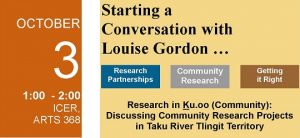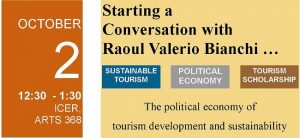September 10, 2019
The Institute for Community Engaged Research is hiring a Research Assistant for 2019-20!
Deadline: Sept. 13, 2019
Job Title: Community and Knowledge Mobilizer
Job Description
The community and knowledge mobilizer will work with The Institute for Community Engaged Research (ICER) faculty, staff and community members under the direction of the Institute director and coordinator. Their work will cover two areas:
1) Co-creating, organizing and facilitating four knowledge mobilization workshops over the 2019-20 academic terms. Participants will be from both the university and the Okanagan community. The workshops will provide innovative and creative tools and strategies for knowledge sharing and include research conducted at UBCO and in the community.
2) Co-design a strategy for fostering relationships between the student body, the Okanagan community and ICER. The new graduate theme – Community Engagement, Social Change and Equity, the Institute presents an opportunity for ICER to take a central role as a hub for those studying and working in this theme on campus. The work study student will help facilitate these linkages by coordinating of research talks, workshops, networking events etc..
Overall duties will include:
Developing and enhancing relationships with students and other ICER members
Working with students to articulate their needs re space, mentorship and support
Working with faculty and partners in the community to facilitate research relationships
Assisting with content creation, organization and facilitation of four knowledge mobilization workshops over the 2018-19 period
Qualifications
The student must be currently enrolled as either a senior undergraduate or graduate student; have some previous experience with knowledge translation and mobilization activities; or have skills which can be used in knowledge mobilization activities: i.e. games, improv, or video editing etc. They should have strong communication and event planning skills, and be aware of community-based research principles and objectives.
Desired Skills
Communication community engaged research facilitation skills Event Planning knowledge mobilization active listening creative skills Community Outreach Organization
Location
Kelowna, British Columbia Canada
Hourly wage
$17/hr
To apply, please submit your cover letter and resume to: icer.ok@ubc.ca
Posted in News
February 4, 2019
Feb.15
11:30 -12:30 pm
Arts 368
Passionate Interests and Community Decision Making: Increasing Food Security in Kamloops, BC
Kamloops, BC is renowned for its community investment in food security – home to Canada’s oldest grassroots food policy council, it also has well-established municipal support for food security programs. Since its formation in 1995, the Kamloops Food Policy Council (KFPC) has collectively made decisions about the initiatives it values, including informal conversations over potlucks, strategic planning and participation in formal community consultation processes. These ongoing processes of deliberation reflect what Bruno Latour describes as the “passionate interests” of actors: intense attachments between members assembled around matters of concern that result in a reconceptualization of “value” as impromptu, mobile, and intransitive. Drawing on ethnographic and archival research conducted with the KFPC since 2017, I situate the network’s decision-making and valuation practices in the broader historical context of agricultural disinvestment in the Kamloops region. As long-term economic and regulatory trends have eroded production and diversity in the sector, the priorities and interests of KFPC have grown more expansive despite the constraints that limit the possibilities of their work. I argue that, as members of the Kamloops food system network assemble around their urgent matters of concern, other “things” function as decision makers alongside them: past and current agricultural infrastructure, consultative planning documents, and indeed, the land itself. Though the network often takes up initiatives that fundamentally don’t compute (in terms of dollars or calories), they erode reliance on dispassionate calculation and render alternative processes of valuation transparent.
Lindsay Harris is a community-based researcher living, eating and gardening with her daughter and partner in Kamloops, BC. Her research interests are focused on grassroots decision-making, food security and rural development in the BC Interior.
Posted in Uncategorized
January 22, 2019
The next Starting a Conversation will be hosted by Sandra Fox.
Thursday, January 24, 2019
12:30 to 1:30 pm
Arts 368
Indigenous Identity in Post-Secondary “Situations”
After working at Aboriginal Programs and Services at UBCO, I noticed how many of the Indigenous students I saw shared similar stories relating to their identities, and coming to post-secondary marked a shift in their understanding of themselves. I wanted to see how post-secondary was influencing Indigenous students and their identity, and what was and wasn’t working. But of course, this process has been about more than just research. Researching Indigenous identity meant confronting my own internal colonization and traumas head-on, causing a cascade of shifts in my personal life I never expected. As a result, my research process has been impacted, but it has all become part of my personal decolonizing journey, as well as my journey back to myself. Given my journey and how it has impacted my studies, and given the connections between my stories and those of the students, what can this institution do to better support Indigenous students?
Sandra Fox is xʷməθkʷəy̓əm but has lived most of her life as a guest in the traditional, ancestral, and unceded territory of the Syilx peoples. She is a mother to two young children and is currently working on her MA, exploring how Indigenous identity is influenced by experiences during post-secondary.
Posted in Event, News, Starting a Conversation
October 15, 2018
Tuesday October 16
12:30 – 1:30 pm, Arts 368
Everyone is welcome to attend!
Engaging communities in rural health workforce retention research
Australia and Canada face significant challenges in achieving adequately staffed rural health services. Factors affecting retention of rural health professionals involve complex interactions of organisational, professional and psychosocial/personal factors and research has shown psychosocial/personal factors to be a major determinant of retention. Building on these findings, I have developed a ‘whole-of-person’(WoP) retention framework that is being trialled in partnership with two public-health services in rural Australia. The WoP framework lends itself to context specific retention interventions. This presentation focuses on community engagement, place-based issues and strategies being trialled to improve the social connection of newly-arrived
non-locals. The challenges and opportunities for rural communities to take an active role in addressing workforce shortages will be discussed. This presentation has broad relevance for rural
communities, government agencies, and health authorities interested in exploring innovative approaches to address health workforce shortages in rural communities.
Dr. Cath Cosgrave is a researcher at the University of Melbourne, Australia. Dr. Cosgrave lives and works in rural Australia. Her research specialises in recruitment and retention of
nursing and allied health professionals. She researches in partnership with health and community services recently piloting whole-of-person approaches to recruitment and retention and brokering community-based solutions for meeting the needs of health professionals
living in rural towns. She is committed to improving the quality of rural health services and the level of health equity and social inclusion for people from vulnerable population groups, particularly those living with mental illness.
Posted in Uncategorized
September 27, 2018

Research in Ku.oo (Community): Discussing Community Research Projects in Taku River Tlingit Territory
In this discussion, Louise describes the many community research initiatives she has been involved with as a Taku River Tlingiut community member and leader, including projects to document traditional land use, language and culture revitalization, land management, and education.
She shares her experience working in partnerships with academics and other Indigenous community members and advice for those who may wish to become involved in community research in the future.
Louise Gordon is a member of the Yanyeidí (Wolf) clan of the Taku River Tlingit First Nation. Born and raised in Atlin, BC, she is a dedicated community leader, former Spokesperson for her community, as well as the past Lands and Resources Director.
She has been involved in many community research projects throughout her career, including partnerships with Diana French (archaeologist) on traditional land use, Christine Schreyer (anthropologist) and Jon Corbett (geographer) on the Taku River Tlingit Place Names project, and working with doctoral student, Colleen Larson on her research on supporting Indigenous students’ sense of belonging.
Please join us and Louise Gordon in the Institute for Community Engaged Research (Arts 368) for a brief presentation, coffee, tea and an engaging, informal discussion. Starting a Conversation is a brown bag lunch series designed to allow more informal conversations with local and visiting scholars. E-mail: icer.ok@ubc.ca with questions.
Everyone welcome!
Arts 368
1:00 to 2:00 pm
Posted in Uncategorized
September 27, 2018

Dr Raoul Valerio Bianchi
University of East London
Tuesday October 2, 2018
12:30 to 1:30
The political economy of tourism development and sustainability
Sustainable tourism has been a long-standing yet consistently ill-defined area of tourism scholarship as well as a predominant concern of the UNWTO. In this discussion Raoul will provide a brief reflection on the contribution of political economy to tourism scholarship with particular emphasis on the unique challenges posed by tourism’s complex ‘industrial’ characteristics for research and advocacy on environmentally sustainable and socially just tourism development.
Dr Raoul Bianchi gained a BSc in Politics and International Relations from the University of Southampton and an MSc in Tourism Management from the University of Surrey before being awarded a Doctorate in the social anthropology of tourism development at University of North London in 2000.
He worked as a Lecturer in Tourism at the University of Derby from 1995 to 1998 before returning to University of North London (subsequently London Metropolitan University) to take up a position as Research Fellow and then Senior Research Fellow in Culture, Tourism and Development. During his time he developed and carried out a range of funded research projects into tourism development, sustainable tourism planning, World Heritage and the cultural politics of heritage, principally in the Canary Islands. He has also worked on EU-funded programmes including EU-TEMPUS and was part of the coordinating team for the Euromed Heritage II project, Mediterranean Voices (http://www.med-voices.org), which explores urban intangible heritage in 13 Mediterranean cities.
Posted in Event, Starting a Conversation
July 26, 2018
Monday December 3, 2018
For the 2nd BRAES/ICER Okanagan Research Forum
Theme: Eating the Okanagan – Exploring Change in our local food systems
Venue: Summerhill Winery, Kelowna, BC
This one day event will bring together researchers from UBC Okanagan and community members
to discuss and share contemporary ideas, challenges and solutions
to changing pressures (social, economic and environmental) on our local food systems.
More information and a call for participation will come soon.
Thank – you!
Posted in Eating the Okanagan, Event, Okanagan Research Forum


